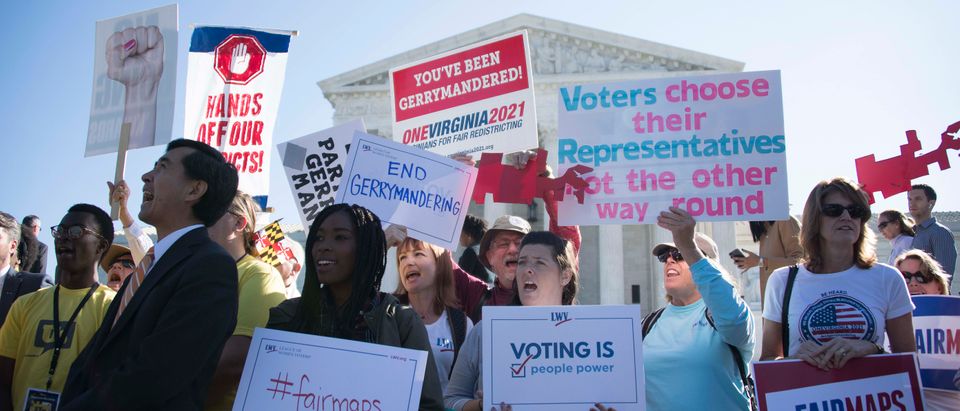In a decision with far-reaching implications for national politics, the Supreme Court ruled Thursday that federal courts do not have power to review partisan gerrymandering claims.
The decision was 5-4, with Chief Justice John Roberts writing for the conservative majority. Justice Elena Kagan led the liberal bloc in dissent.
Gerrymandering divides the Court into the usual ideological coalitions. While the liberal justices believe the Court should act to save the legitimacy of the democratic process, the conservatives are wary of judicial intervention in the highly-politicized redistricting process. They are also skeptical that the courts can formulate clear and predictable rules to police partisan line-drawing.
The chief justice said that partisan gerrymandering, though distasteful, has been a feature of American politics since the founding generation. For Roberts, the decisive fact was that the founders addressed the problem by splitting authority over elections between Congress and state legislatures — the states can establish the “times, places, and manner of holding elections” subject to congressional supervision.
Though the courts may police racial bias and ensure equality of population among districts, they were not, Roberts said, given authority “to allocate political power and influence.”
“The Framers were aware of electoral districting problems and considered what to do about them,” Roberts wrote. “They settled on a characteristic approach, assigning the issue to the state legislatures, expressly checked and balanced by the federal Congress.”
“At no point was there a suggestion that the federal courts had a role to play,” the chief added. “Nor was there any indication that the Framers had ever heard of courts doing such a thing.”
Elsewhere in the majority opinion, the Court noted that many states have recently enacted popular measures to remove partisanship from redistricting, while Congress is entertaining legislation that would vest line-drawing authority with independent commissions using neutral criteria.
“We express no view on any of these pending proposals,” the chief wrote. “We simply note that the avenue for reform established by the Framers, and used by Congress in the past, remains open.”
In a mournful dissent, Kagan said the decision would undermine public faith in the very cornerstones of the political process.
“Of all times to abandon the Court’s duty to declare the law, this was not the one,” Kagan wrote. “The practices challenged in these cases imperil our system of government. Part of the Court’s role in that system is to defend its foundations. None is more important than free and fair elections. With respect but deep sadness, I dissent.”
The first case, Rucho v. Common Cause, arose in North Carolina, where the GOP commands a lopsided majority in the state congressional delegation despite splitting the statewide vote evenly with Democrats. A three-judge district court sided with a coalition of voters and advocacy groups challenging North Carolina’s map, and forbade its use after the 2018 elections.
Democrats are the offenders in the second case, Lamone v. Benisek, a challenge to a single congressional district in western Maryland. In Benisek, Maryland’s Democratic state legislature enacted a congressional district map that ensured longtime GOP Rep. Roscoe Bartlett would lose his 2012 reelection bid.
Though west Maryland voters returned Bartlett to Congress ten consecutive times, the new lines incorporated portions of the Washington, D.C., suburbs, adding tens of thousands of Democrats to his district. In litigation that ensured, former Gov. Martin O’Malley admitted that he want to rig the district to oust Bartlett.
As expected, Bartlett lost his seat by twenty points to Democrat John Delaney, who is now seeking the party’s 2020 Democratic presidential nomination.
The Supreme Court has never laid out criteria for policing partisan gerrymandering. Retired Justice Anthony Kennedy repeatedly chartered an inconclusive middle way during his tenure on the Court. In a 2004 case called Vieth v. Jubelirer, five justices — including Kennedy — said they believe courts should stop extreme partisan gerrymanders that marginalize wide swaths of voters.
At the same time, Kennedy qualified his decision, explaining that courts should not step in until they identify clear, manageable standards for assessing maps. Politics, Kennedy said, will always drive redistricting to a certain extent. What judges need is a simple test for determining when politics was used excessively.
Anti-gerrymandering plaintiffs presented the Court with different theories for identifying partisanship in redistricting in a pair of 2018 cases. After extended consideration, the justices effectively punted.
This is breaking news. This post will be updated.
All content created by the Daily Caller News Foundation, an independent and nonpartisan newswire service, is available without charge to any legitimate news publisher that can provide a large audience. All republished articles must include our logo, our reporter’s byline and their DCNF affiliation. For any questions about our guidelines or partnering with us, please contact licensing@dailycallernewsfoundation.org.












